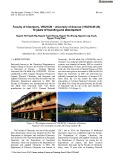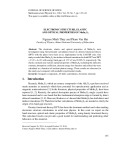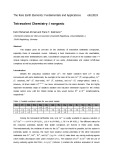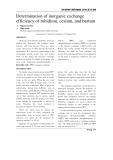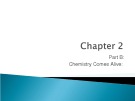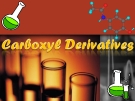
Inorganic compounds
-
The Department of Organic Chemistry, the Department of Inorganic and Applied Chemistry, and the Department of Chemistry are among the six departments, six majors, and three research laboratories that make up the Faculty of Chemistry today, some 70 years after its founding. Physical chemistry, analytical chemistry, polymer chemistry, medicinal chemistry, and three key-research labs, including the labs for natural compounds, cancer, and computational chemistry.
 6p
6p  dianmotminh02
dianmotminh02
 03-05-2024
03-05-2024
 7
7
 1
1
 Download
Download
-
The elastic constants and various optical properties of MnIn2S4 including the dielectric constant, absorption coefficient, electron energy loss function and reflectivity were calculated as a function of incident photon energy. Those results are discussed in this study and compared with available experimental results.
 9p
9p  tamynhan8
tamynhan8
 04-11-2020
04-11-2020
 16
16
 3
3
 Download
Download
-
Tetravalent chemistry: Inorganic. This chapter gives an overview on the chemistry of tetravalent lanthanide compounds, especially those of tetravalent cerium. Following a brief Introduction it covers the tetrahalides, dioxides and other lanthanides(IV) salts. Coordination compounds of cerium in the oxidation state +4 include halogeno complexes and complexes of oxo acids, β-diketonates and related Schiff-base complexes as well as porphyrinates and related complexes.
 13p
13p  duchlpr
duchlpr
 01-05-2018
01-05-2018
 23
23
 0
0
 Download
Download
-
The results showed that the exchange efficiency was high for both rubidium and cesium. The exchange efficiency ratios depended on the kind of inorganic compound and acid concentration.
 9p
9p  bautroibinhyen17
bautroibinhyen17
 13-02-2017
13-02-2017
 31
31
 3
3
 Download
Download
-
Biochemistry is the study of the chemical composition and reactions of living matter. All chemicals in the body fall into one of two major classes: organic or inorganic compounds. Organic compounds contain carbon. All organic compounds are covalently bonded molecules, and many are large. All other chemicals in the body are considered inorganic compounds. These include water, salts, and many acids and bases. Organic and inorganic compounds are equally essential for life.
 51p
51p  tangtuy07
tangtuy07
 02-04-2016
02-04-2016
 41
41
 3
3
 Download
Download
-
In organic chemistry, a carbonyl group is a functional group composed of a carbon atom double-bonded to an oxygen atom: C=O. It is common to several classes of organic compounds, as part of many larger functional groups. The term carbonyl can also refer to carbon monoxide as a ligand in an inorganic or organometallic complex. Other organic carbonyls are urea and the carbamates, the derivatives of acyl chlorides chloroformates and phosgene, carbonate esters, thioesters, lactones, lactams, hydroxamates, and isocyanates.
 68p
68p  loc5heo
loc5heo
 07-06-2011
07-06-2011
 122
122
 14
14
 Download
Download
-
8.4 II.8.4 Arsenic compounds and other inorganic poisons by Sinichi Suzuki and Yasuhiro Suzuki Introduction The Wakayama Curry Poisoning Incident taking place in August 1998, followed by various imitative poisoning incidents, is still fresh in our memory, because they gave a severe shock and anxiety to the Japanese society. The poison, which had been used in the Wakayama Curry Poisoning Incident was an arsenitea, a classical poison.
 11p
11p  bigbaby87
bigbaby87
 01-09-2010
01-09-2010
 91
91
 12
12
 Download
Download
CHỦ ĐỀ BẠN MUỐN TÌM








